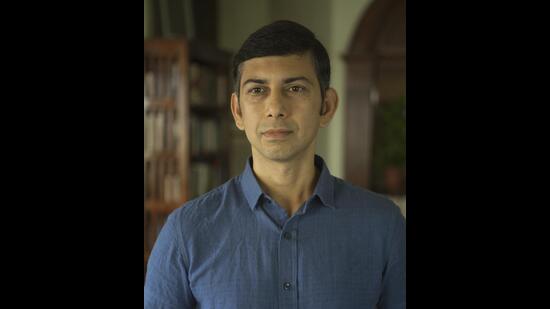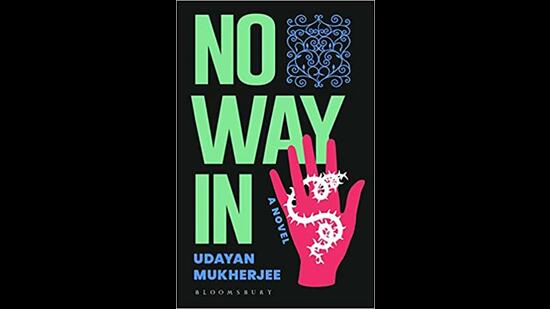Review: No Way In by Udayan Mukherjee
“Just as animals in the wild tend to size each other up, human beings too are inclined to profile each other.” This is the opening sentence of CNBC’s former anchor and managing editor, Udayan Mukherjee’s fourth book, No Way In, a novel about identity and secrets in contemporary India.
It’s 2014 and the high-stakes national election is round the corner when we enter Jol Pori, the sprawling South Kolkata home of the Banerjees — a prosperous businessman Rana, his wife Ila, and their eight-year-old son Shubho. While Rana comes from a business background, Ila is from a distinguished household of intellectuals.
Their cook Sabita lives in a room on the terrace of the house with her 10-year-old son, Dinu. Sabita, who fled her home in Assam when communal violence hit the region has recurring nightmares.
Despite their differences, the two children, Dinu and Shubho, are great friends. However, Rana believes children of “servants” should not be seen or heard and “their presence thinly tolerated.” He often misbehaves with Sabita, shouting at her and even molests her when no one is around. Ila, however, is sympathetic to the needs of the poor and disadvantaged, which Sabita believes is akin to “lamenting the plight of hungry beggars on a full stomach”.
Unequal Lives
The country’s jarring social inequality is highlighted throughout. At the beginning of the book, a well-to-do woman accuses a young maid of stealing an expensive necklace set and states that all Nepalis are “crooks” and responsible for various domestic crimes. Elsewhere, there is a reference to the plight of a young Bangladeshi maid who was locked up for two days in a bathroom without food or water because she had burnt a saree while ironing it.
Political Waves
Rana’s childhood friend is a key member of the party tipped to form the central government in the impending elections. When the results are out, emotions run high on the streets. Policemen are posted at crossings while some crowds celebrate and others raise angry slogans. Even as Rana celebrates the results with Samik, Ila’s family is in a state of mourning. “Was their idea of the nation as benign, tolerant, only a deluded, romantic concoction, with no basis in reality?” they wonder.
The ‘Other’
The story highlights the Bengali Hindu resentment of Muslims. “They were the Other and would always be,” Mukherjee writes. Sixty-eight year old Rafiq was the Banerjee’s driver for over three decades. On a Hindu festival day, when he jokingly tells Shubho that he is feeding him beef, Rana turns him out.
Towards the middle of the book, it is revealed that Sabita and Dinu are Muslim when, on the football field, the boy’s friends tease him on noticing that he is circumcised. Sabita explains to her son that it is nothing to be ashamed of and that it is part of his identity. Sabita herself is constantly battling with repressed memories that threaten to overwhelm her as they do when she watches the news about a communal flare-up in Assam.

Sabita and Dinu’s back story is revealed when the mother recounts it to her son. Sabita, whose real name is Saba, and her husband Ejaz were children together in Nellie in Assam. During the infamous massacre there, their parents were butchered. Saba was brought up by foster parents in Bongaigaon and later moved to Kokrajhar, where she once again met Ejaz, who has grown up to be devoutly religious. When trouble began brewing in Kokrajhar, she climbed onto a train with Dinu and left for Kolkata. In the big city they assumed new identities — the child Danish transforms into Dinu and Saba becomes Sabita — relinquishing their Muslim names to be safe. Sabita had been working at the Banerjee household for two years when the past began catching up with her.
Ejaz comes to Kolkata looking for a job and his estranged family. While roaming the city, he happens to find Danish, who is happy to reunite with his long-lost father. Ejaz asks him not to tell his mother about their meeting and hatches a far-fetched plan to reconcile with them. He promises Danish a new life — one with “no riot, no tension, no scrounging around.” When Sabita learns the truth, she realises they can no longer live a lie, and escapes with Danish once again.
Udayan Mukherjee’s intense novel highlights the predicament of the marginalised in a nation riven by communal divisions and reiterates that an individual’s perspective invariably depends on her own predicament.
A freelance writer based in New Delhi, Neha Kirpal writes primarily on books, music, films, theatre and travel
The views expressed are personal
Enjoy unlimited digital access with HT Premium
Subscribe Now to continue reading

“Just as animals in the wild tend to size each other up, human beings too are inclined to profile each other.” This is the opening sentence of CNBC’s former anchor and managing editor, Udayan Mukherjee’s fourth book, No Way In, a novel about identity and secrets in contemporary India.
It’s 2014 and the high-stakes national election is round the corner when we enter Jol Pori, the sprawling South Kolkata home of the Banerjees — a prosperous businessman Rana, his wife Ila, and their eight-year-old son Shubho. While Rana comes from a business background, Ila is from a distinguished household of intellectuals.

Their cook Sabita lives in a room on the terrace of the house with her 10-year-old son, Dinu. Sabita, who fled her home in Assam when communal violence hit the region has recurring nightmares.
Despite their differences, the two children, Dinu and Shubho, are great friends. However, Rana believes children of “servants” should not be seen or heard and “their presence thinly tolerated.” He often misbehaves with Sabita, shouting at her and even molests her when no one is around. Ila, however, is sympathetic to the needs of the poor and disadvantaged, which Sabita believes is akin to “lamenting the plight of hungry beggars on a full stomach”.
Unequal Lives
The country’s jarring social inequality is highlighted throughout. At the beginning of the book, a well-to-do woman accuses a young maid of stealing an expensive necklace set and states that all Nepalis are “crooks” and responsible for various domestic crimes. Elsewhere, there is a reference to the plight of a young Bangladeshi maid who was locked up for two days in a bathroom without food or water because she had burnt a saree while ironing it.
Political Waves
Rana’s childhood friend is a key member of the party tipped to form the central government in the impending elections. When the results are out, emotions run high on the streets. Policemen are posted at crossings while some crowds celebrate and others raise angry slogans. Even as Rana celebrates the results with Samik, Ila’s family is in a state of mourning. “Was their idea of the nation as benign, tolerant, only a deluded, romantic concoction, with no basis in reality?” they wonder.
The ‘Other’
The story highlights the Bengali Hindu resentment of Muslims. “They were the Other and would always be,” Mukherjee writes. Sixty-eight year old Rafiq was the Banerjee’s driver for over three decades. On a Hindu festival day, when he jokingly tells Shubho that he is feeding him beef, Rana turns him out.
Towards the middle of the book, it is revealed that Sabita and Dinu are Muslim when, on the football field, the boy’s friends tease him on noticing that he is circumcised. Sabita explains to her son that it is nothing to be ashamed of and that it is part of his identity. Sabita herself is constantly battling with repressed memories that threaten to overwhelm her as they do when she watches the news about a communal flare-up in Assam.

Sabita and Dinu’s back story is revealed when the mother recounts it to her son. Sabita, whose real name is Saba, and her husband Ejaz were children together in Nellie in Assam. During the infamous massacre there, their parents were butchered. Saba was brought up by foster parents in Bongaigaon and later moved to Kokrajhar, where she once again met Ejaz, who has grown up to be devoutly religious. When trouble began brewing in Kokrajhar, she climbed onto a train with Dinu and left for Kolkata. In the big city they assumed new identities — the child Danish transforms into Dinu and Saba becomes Sabita — relinquishing their Muslim names to be safe. Sabita had been working at the Banerjee household for two years when the past began catching up with her.
Ejaz comes to Kolkata looking for a job and his estranged family. While roaming the city, he happens to find Danish, who is happy to reunite with his long-lost father. Ejaz asks him not to tell his mother about their meeting and hatches a far-fetched plan to reconcile with them. He promises Danish a new life — one with “no riot, no tension, no scrounging around.” When Sabita learns the truth, she realises they can no longer live a lie, and escapes with Danish once again.
Udayan Mukherjee’s intense novel highlights the predicament of the marginalised in a nation riven by communal divisions and reiterates that an individual’s perspective invariably depends on her own predicament.
A freelance writer based in New Delhi, Neha Kirpal writes primarily on books, music, films, theatre and travel
The views expressed are personal
Enjoy unlimited digital access with HT Premium
Subscribe Now to continue reading

